Related Research Articles

Mauritania is a presidential democracy, but has suffered from repeated military coups since its Independence in November 1960. For 18 years after independence, Mauritania was a one-party state under Moktar Ould Daddah. This was followed by decades of military rule. The first fully democratic presidential election in Mauritania occurred on 11 March 2007, which marked a transfer from military to civilian rule following the military coup in 2005. The election was won by Sidi Ould Cheikh Abdallahi, who was ousted by another military coup in 2008 and replaced by general Mohamed Ould Abdel Aziz. Mauretania underwent its first peaceful transition of power after the 2019 presidential election, although this was between two presidents of the ruling UPR party and former army generals.
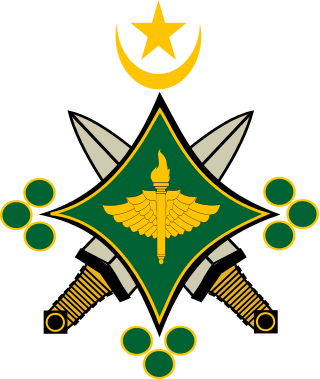
The Armed Forces of Mauritania is the defence force of the Islamic Republic of Mauritania, having an army, navy, air force, gendarmerie, and presidential guard. Other services include the national guard and national police, though they both are subordinated to the Ministry of the Interior. As of 2018, the Mauritanian armed forces budget was 3.9% of the country's GDP.

Mu'awiya Ould Sid'Ahmed al-Taya is a Mauritanian military officer and politician who served as the President of Mauritania from 1984 to 2005. He also served as the fifth Prime minister of Mauritania from 1981 to 1992 except for a brief period in 1984.
The Popular Front is a small political party in Mauritania.

Col. Mohamed Khouna Ould Haidalla was the head of state of Mauritania from 4 January 1980 to 12 December 1984.

The Military Council for Justice and Democracy was a supreme political body of Mauritania. It served as the country's interim government following the coup d'état which ousted the President Maaouya Ould Sid'Ahmed Taya on 3 August 2005. It was led by the former Director of the national police force, Colonel Ely Ould Mohamed Vall. After seizing power, it quickly pledged to hold elections within two years and promised that none of its own members would run.
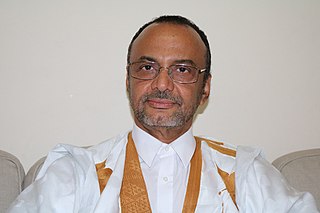
Sidi Mohamed Ould Boubacar is a Mauritanian politician who has been Prime Minister of Mauritania twice, from 1992 to 1996 and again from 2005 to 2007.

Messaoud Ould Boulkheir is a political figure from Mauritania and a leader in the Haratine community. Messaoud also contributed towards the end of the 1989 events in Mauritania, protecting the right of the victims and the emancipation of the Haratine in Mauritania with his party.
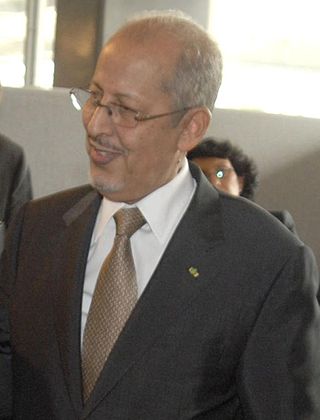
Presidential elections were held in Mauritania on 11 March 2007. As no candidate received a majority of the votes, a second round was held on 25 March between the top two candidates, Sidi Ould Cheikh Abdallahi and Ahmed Ould Daddah. Abdallahi won the second round with about 53% of the vote and took office in April.
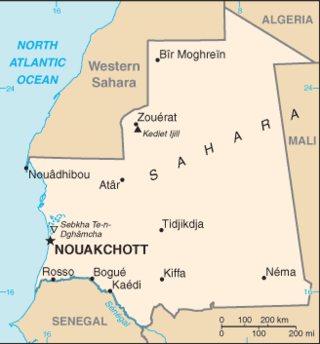
A military coup took place in Mauritania on 3 August 2005. President Maaouya Ould Sid'Ahmed Taya was ousted by the Armed Forces of Mauritania and replaced by the Military Council for Justice and Democracy (CMJD), headed by Ely Ould Mohamed Vall, while Taya was in Saudi Arabia attending the funeral of King Fahd of Saudi Arabia.
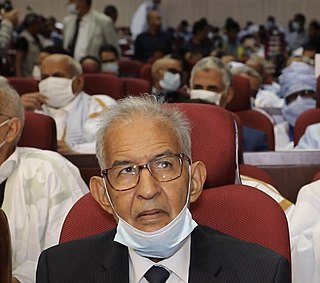
Ahmed Ould Daddah is a Mauritanian economist and a politician. He is a half-brother of Moktar Ould Daddah, the first President of Mauritania, and belongs to the Marabout Ouled Birri tribe. He is currently the President of the Rally of Democratic Forces (RFD) and was designated as the official Leader of the opposition following the 2007 presidential election, in which he placed second.
Zeine Ould Zeidane is a Mauritanian economist and politician. He placed third as a candidate in the March 2007 presidential election, and he subsequently served as Prime Minister from April 2007 to May 2008.
Ibrahima Moctar Sarr is a Mauritanian journalist and politician of the Fulani ethnicity. Running as an independent candidate, he placed fifth in the March 2007 presidential election, and he has been the President of the Alliance for Justice and Democracy/Movement for Renewal (AJD/MR) party from August 2007 until January 2024.
The People's Progressive Alliance is a small political party in Mauritania.
In December 1984, Haidallah was deposed by Colonel Maaouya Ould Sid'Ahmed Taya, who, while retaining tight military control, relaxed the political climate. Ould Taya moderated Mauritania's previous pro-Algerian stance, and re-established ties with Morocco during the late 1980s. He deepened these ties during the late 1990s and early 2000s as part of Mauritania's drive to attract support from Western states and Western-aligned Arab states. Mauritania has not rescinded its recognition of Polisario's Western Saharan exile government and remains on good terms with Algeria. Its position on the Western Sahara conflict has been, since the 1980s, one of strict neutrality.

Mohamed Ould Abdel Aziz is a retired Mauritanian military officer and politician who served as the 8th president of Mauritania from 2009 to 2019.

Presidential elections were held in Mauritania on 18 July 2009. Mohamed Ould Abdel Aziz, who led the 2008 coup d'état, won a narrow first-round majority in the election, according to official results. A second round, if necessary, would have been held on 1 August 2009.
Mohamed Lemine Ch'bih Ould Cheikh Malainine is a Mauritanian politician. He has served as a former leader of the Qadiriyya Islamic brotherhood.

The 1984 Mauritanian coup d'état was a bloodless military coup in Mauritania which took place on 12 December 1984.

The 2003 Mauritanian coup d'état attempt was a violent military coup attempt in Mauritania which took place on 8–9 June 2003.
References
- ↑ "Government arrests mastermind behind coup plots". The New Humanitarian. 2004-10-12. Retrieved 2023-09-30.
- ↑ "En bref: Mauritanie, coup d'État raté". Le Devoir (in French). 2003-06-09. Retrieved 2023-09-30.
- ↑ à 00h00, Par Le 26 juin 2003 (2003-06-25). "La tentative de putsch a été meurtrière". leparisien.fr (in French). Retrieved 2023-09-30.
{{cite web}}: CS1 maint: numeric names: authors list (link) - 1 2 "MAURITANIA: Government arrests mastermind behind coup plots", IRIN Africa, October 12, 2004.
- ↑ Staff Reporter (2004-10-13). "Mauritania arrests coup mastermind". The Mail & Guardian. Retrieved 2023-09-30.
- ↑ "Une supposée tentative de coup d'Etat déjouée en Mauritanie". Le Monde.fr (in French). 2004-08-11. Retrieved 2023-09-30.
- ↑ "Defence minister confirms coup plot, arrests". The New Humanitarian. 2004-08-11. Retrieved 2023-09-30.
- ↑ "Mauritania coup trial ends with 84 guilty verdicts" Archived 2006-10-17 at the Wayback Machine , Middle East Online, February 3, 2005.
- ↑ "Mauritania ends mass coup trial". www.aljazeera.com. Retrieved 2023-09-30.
- ↑ "Coup plotters get life in prison but escape death sentence". The New Humanitarian. 2005-02-03. Retrieved 2023-09-30.
- ↑ L'Orient-Le Jour, L'Orient-Le Jour (9 August 2005). "Mauritanie - Ould Taya appelle " ses forces à intervenir " La junte militaire à Nouakchott confirme ses intentions démocratiques". www.lorientlejour.com (in French) (published 2005).
- ↑ "MAURITANIA: Junta declares general amnesty for political prisoners", IRIN, September 5, 2005.
- ↑ "Le parti "Hatem" présente M. Salah Ould Hanena, candidat aux élections présidentielles" Archived 2007-09-28 at the Wayback Machine , Agence Mauritanienne d'Information, January 9, 2007 (in French).
- ↑ "Le conseil constitutionnel proclame les résultats du premier tour de l'élection présidentielles du 11 mars 2007" [ permanent dead link ], Agence Mauritanienne d'Information, March 15, 2007 (in French).
- ↑ "The two run-off candidates continue to woo the Mauritanian voters" [ permanent dead link ], African Press Agency, March 16, 2007.
- ↑ "Sidi Ould Cheikh Abdallahi remporte l'élection présidentielle en Mauritanie". Courrier international (in French). 2007-03-27. Retrieved 2023-09-30.
- ↑ Mauritania Opposition Demands Election After President Is Shot, Bloomberg Business Week, November 2, 2012.